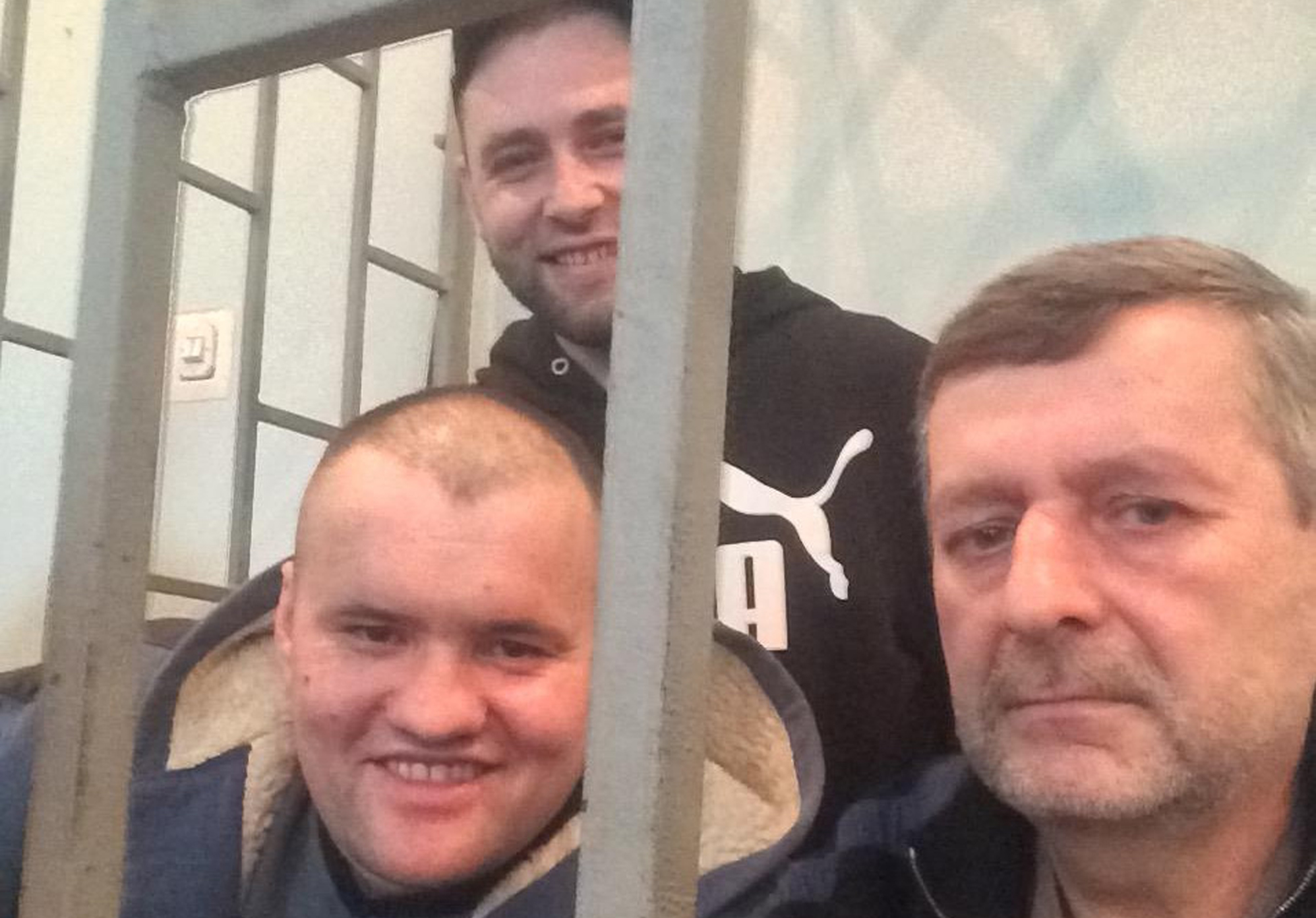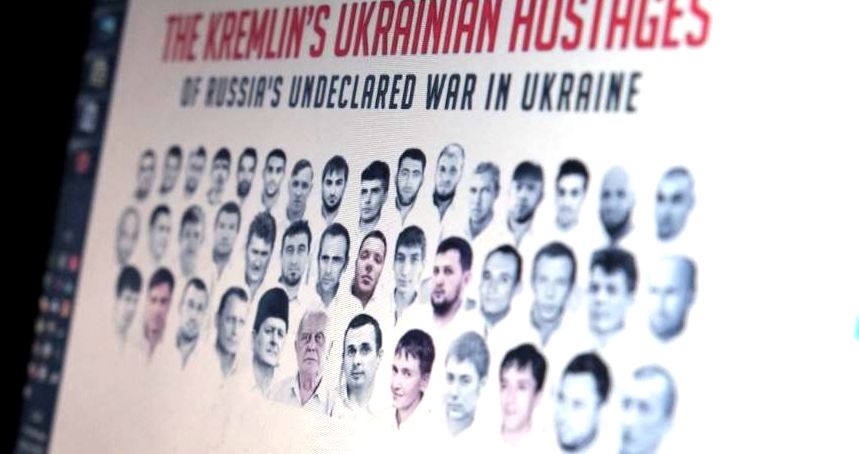On February 26, Ukraine observed the Day of Crimeans’ Resistance to the Russian Occupation. That day, a march of solidarity with the compatriots remaining in the occupied territory was held in Kyiv under the catchword “Crimea Is Ukraine.” At the same time in Moscow, a column of activists holding the slogans to stop repression in Crimea and release political prisoners took part in the march in memory of Boris Nemtsov, the Russian opposition leader murdered two years ago. The column’s convenors believe that the fulfillment of their demands would be the worthiest wreath on the grave of the leading Putin’s critic.
Meanwhile, in the capital of Crimea, Simferopol, the puppets appointed by Putin dream of one thing: the silence and humility of local residents without any demonstrations. However, they cannot erase from people’s minds what happened there exactly three years ago: a huge resistance rally that destroyed the scenario of Crimea’s allegedly ‘legitimate’ secession from Ukraine. The rally clearly disproved the image of ‘overwhelming’ acclaim and euphoria of the population about the submission to a foreign state.
Today, the Crimean Tatars persist to be the most vocal, numerous, and organized force united with their non-acceptance of the occupation. They have exceptional experience of fighting for their rights since the Soviet era, which is why the Russian government is afraid of them so much. Thus it demonstratively punishes the Tatars who peacefully opposed its invasion in Ukraine’s southern region. Russia resorts to intimidation because she cannot master her own fear.
Perhaps the Kremlin is trying to ease itself by the fact that tens of thousands of those not agreeing to the annexation left for mainland Ukraine. But it is unable to ‘squeeze’ the entire nation from the historical homeland. Over seventy-five years, the Crimean Tatars survived the genocidal deportation from the peninsula to Central Asia, decades of struggle for the return, and difficult years of reconstructing their life from scratch in Crimea. They knew from the beginning that new Russian rule means the elimination of what they had achieved with hard work in sovereign Ukraine. Therefore, they actively supported the Revolution of Dignity against the corrupt and pro-Kremlin Yanukovych dictatorship. Since the first days of Russia’s hybrid intervention in Crimea, they stood for the Ukrainian state and aided its military units.
Read more: Deportation, genocide, and Russia’s war against Crimean Tatars
And the Crimean Tatars became the primary targets of murder, abduction, arbitrary arrests and unlawful criminal prosecution under Russia. In March 2015, their acknowledged leader, veteran of the Soviet dissident movement Mustafa Dzhemilev, speaking at the UN Security Council, noted that the current repressive regime in Crimea had in some ways surpassed the communist times. He pointed out that Moscow had failed to find a Tatar collaborator to drive the pacification of the fellow people on the example of rebellious Chechnya (where the resistance was suppressed by Akhmat and Ramzan Kadyrov, former anti-Russian fighters turned ‘Heroes of Russia’).
In 2014, the Kremlin boss made an attempt to blackmail Dzhemilev by the fate of his son Hayser, who was held hostage, but to no avail (Hayser was then illegally kept in Russian jail till November 2016). Having realized at last that there was no way to a deal, the occupation ‘authorities’ gambled on the physical and information isolation of leading Crimean Tatar figures from their compatriots and supporters. Russian judges imposed a ban on the Mejlis, the self-government body of the Crimean Tatars, and opened a hunt for its members. Mustafa Dzhemilev and the Mejlis chairman Refat Chubarov were declared persona non grata in Crimea. Chubarov and his deputy Ilmi Umerov (who remains in the occupied territory) are accused of ‘encroachment on Russia’s territorial integrity’ for publicly stating that the peninsula must return to Ukraine.
Read more: Who is Ilmi Umerov, the Crimean Tatar Russia so fears?
In January 2015, another deputy chairman of the Mejlis, Akhtem Chiyhoz, was summoned to the so-called ‘Investigative Committee’ in Simferopol. He did not make back as he was detained on suspicion of ‘organizing mass unrest’ on February 26 previous year. In the case of a guilty verdict, he faces up to fifteen years in prison.
The rally on February 26
What exactly happened on 26 February 2014? A few days after President Yanukovych, having failed to wipe out Maidan protesters in Kyiv, fled from Ukraine to Russia, two rallies took place in the center of Simferopol. One of them was pro-Ukrainian, involving many thousands of Crimean Tatars, and the second was pro-Russian, coordinated by the local criminal figure and leader of the small ‘Russian Unity’ party Sergey Aksyonov (illegally declared ‘head of Crimea’ a few days later). The two mutually opposing actions coexisted in one square in front of the Crimean Supreme Council (CSC) until several busloads of militant ‘Cossacks’ arrived from Sevastopol, where the Russian Black Sea Fleet leased a base from Ukraine. After their arrival, a squash started between the two sides, and clashes broke out in places.
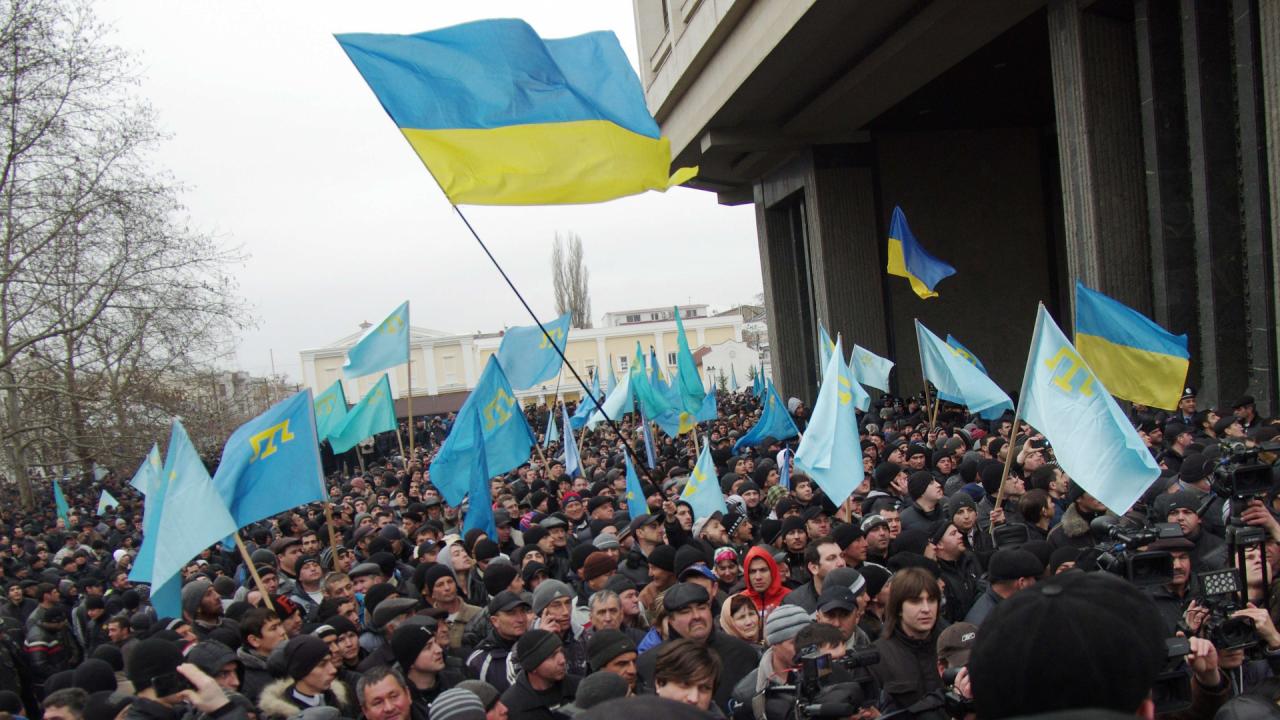
As the date engraved on the Russian medal for the ‘return of Crimea’ suggests, Moscow launched the mechanism of a special operation in south Ukraine when Yanukovych was still in power. After the revolution won in Kyiv, the Russian curators of the operation had in mind that on February 26, the Crimean parliament would convene and ask Putin to ‘help.’
Unexpectedly, the mass pro-Ukrainian rally in Simferopol spoiled their game. The extraordinary CSC session did not open that day, and the Kremlin was to trigger the nightly violent seizure of the Crimean parliament by the Russian special forces. Igor Girkin-‘Strelkov,’ the Russian military intelligence officer (later known as chieftain who invaded Ukraine’s Donbas), admits that he personally organized the forced delivery of Crimean MPs to the closed session of the Supreme Council. There, at gunpoint, they had to vote for calling an unconstitutional ‘referendum on the status of Crimea.’ In that way, the fact of foreign aggression became evident to the world. But post factum, the invaders chose to revenge on the activists of February 26. Some of those activists pay for destroying Putin’s original plan by their freedom. All of them are Crimean Tatars.
Three years after the event, and two years after his arrest, Akhtem Chiygoz confirms that the principles he and his followers defended in February 2014 have not changed.
“We saw and see the development of Crimea, our homeland, as a successful and attractive region,” he writes in a letter from a prison cell. “And never did we question for a moment the territorial integrity of Ukraine and our belonging to [Ukrainian] citizenship. We did not consider an alternative.”
Three Crimean Tatars in prison for participating in protests
Five other Crimean Tatars were also charged with ‘involvement in mass unrest’ on February 26: Eksender Kantemirov, Arsen Yunusov, Eskender Emirvaliev, Ali Asanov, and Mustafa Dehermendzhy. The latter two are kept in the Simferopol remand jail along with Chiygoz and dozens of people arrested in other political cases. The dearest ones are waiting for them at home. Chiygoz has elderly parents, a wife, four children and four grandchildren. Asanov and Dehermendzhy each have four kids as well. The youngest Dehermendzhy’s child was born when the father was already held in custody. Both Mustafa and Ali were blackmailed by the opportunity of release and return to their families—in exchange for slandering Akhtem Chiygoz. They rejected the offer.
Human rights activists have repeatedly emphasized that the circumstances of February 26 rally cannot be subject to the investigation under Russian law, as the action took place in the Ukrainian territory, and the defendants and complainants alike were indisputably Ukrainian citizens at the time.
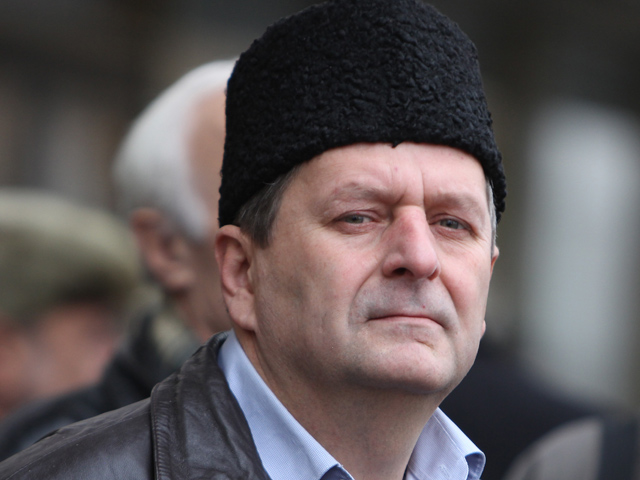
Russia declared Crimea ‘her’ region and illegally ascribed her own nationality to the local residents a few weeks later. It is worth noting that, despite the videos taken that day show pro-Russian activists provoking the clashes and participating in fights, none of them has been accused or even suspected. Instead, they make up 100% of people summoned to the ‘court’ as injured persons. Surprisingly for the state prosecution, the witnesses interrogated over the months of trial one after another refused to repeat the allegations about Chiygoz’s role in ‘organizing unrest’ or his ‘responsibility’ for the harm they had supposedly suffered.
“Every individual is entitled to be present at a rally and claim one’s rights. This is prescribed by all the international standards, and, in particular, by the Constitution of the Russian Federation,” Chiygoz stated on trial.
“One of the ‘arguments’ for keeping me and fellow defendants in custody is simply a personal opinion of the detective and prosecution officers. How can I prove to you that I could leave a hundred times? When I was said: ‘Go away, we’ll arrest you because you are undesirable here,’ I stayed at home nonetheless.
What are other ‘reasons’: the ‘argument’ that I am a Ukrainian citizen and I can flee? But whose citizen yesterday was the prosecutor sitting here? And is it really a crime, to be a citizen of Ukraine?!”
Nikolai Polozov, the lawyer of Akhtem Chiygoz and Ilmi Umerov, notes that the complete contempt for justice and human rights makes Crimea noteworthy even against the background of lawlessness characteristic of Putin’s Russia. ‘Investigators’ and ‘judges,’ many of whom got their jobs before the annexation and betrayed Ukraine, try to curry favor with the new bosses and so take the most absurd decisions.
It seems that the occupation ‘authorities’ do not assume a possibility of not guilty verdicts in the ‘February 26 case’ and other show trials. A good example of their attitude is when at the end of 2015, the so-called ‘head of Crimea’ Sergey Aksyonov threatened to punish the prisoners for the food and energy blockade of the peninsula established by activists from mainland Ukraine. The losses incurred by Russian economy as a result of the blockade, Aksyonov arrogantly declared, should be compensated by imprisoned Ukrainian citizens with 15 to 20 years of forced labor in Russian Arctic.
Unfortunately, despite the bitter experience of ethnic cleansings, apartheid, and genocide, the world has not developed effective tools to prevent the repetition of similar tragedies in the future. But everyone personally and each government at the international level has a choice: either to try to help the victims or to be a passive accomplice of collective punishment who silently observes how the lives of innocent people are being destroyed.
“I took the photos of fathers in the courts and their children in the houses with doors broken off during the searches. I photographed crying mothers everywhere,” writes Anton Naumlyuk, the Russian journalist chronicling the fates of Russia’s hybrid war hostages. “This is an endless series of tearful faces, grief, and humiliation.”
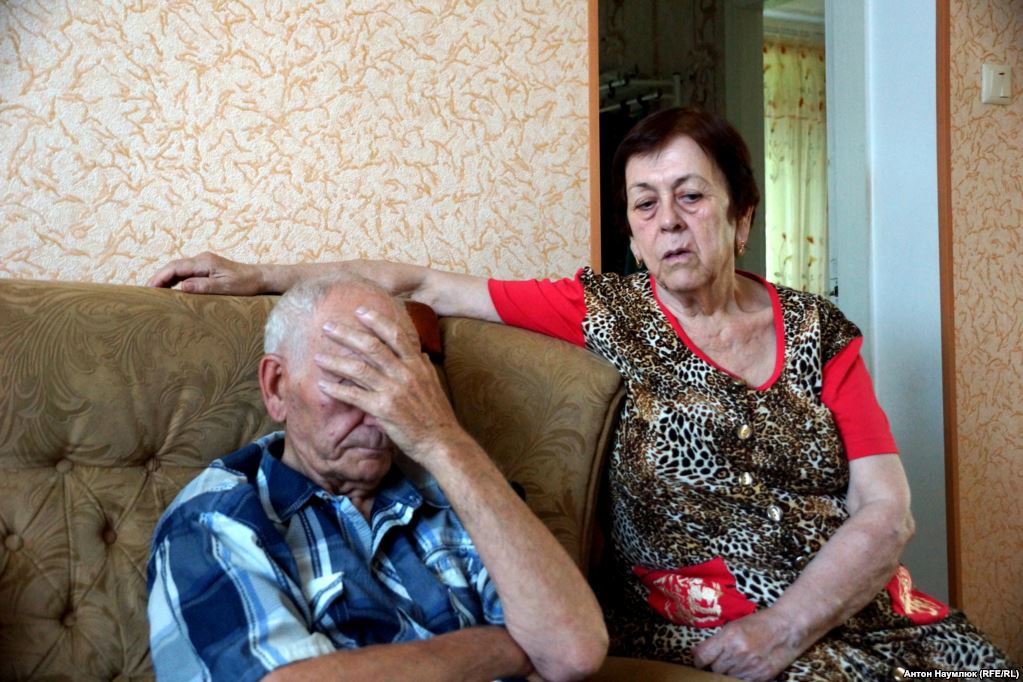
In January 2017, the International Court of Justice took up Ukraine’s lawsuit on the systemic nature of racial discrimination introduced by Russia in Crimea. Earlier, the UN General Assembly urged Moscow to secure the free access of international human rights missions to the occupied territory.
Despite the scope of the threat hanging over the Crimean Tatars, the Kremlin is unlikely to succeed in suppressing their resistance with show trials and prison sentences. When on 21 February 2017, the so-called ‘judges’ in Simferopol arrested eleven persons at once—only because they manifested solidarity with other persecuted compatriots—the lawyer Edem Semedlyaev warned the occupiers:
“Maybe the [Russian] government doesn’t like that there are civic activists but among the Crimean Tatars it is as follows: if ten people are imprisoned today, a hundred will come instead tomorrow. This is a natural process since everyone is outraged at what’s going on, and people will go out and defend their rights. Because the Crimean Tatar people are a nation of dissidents.”




